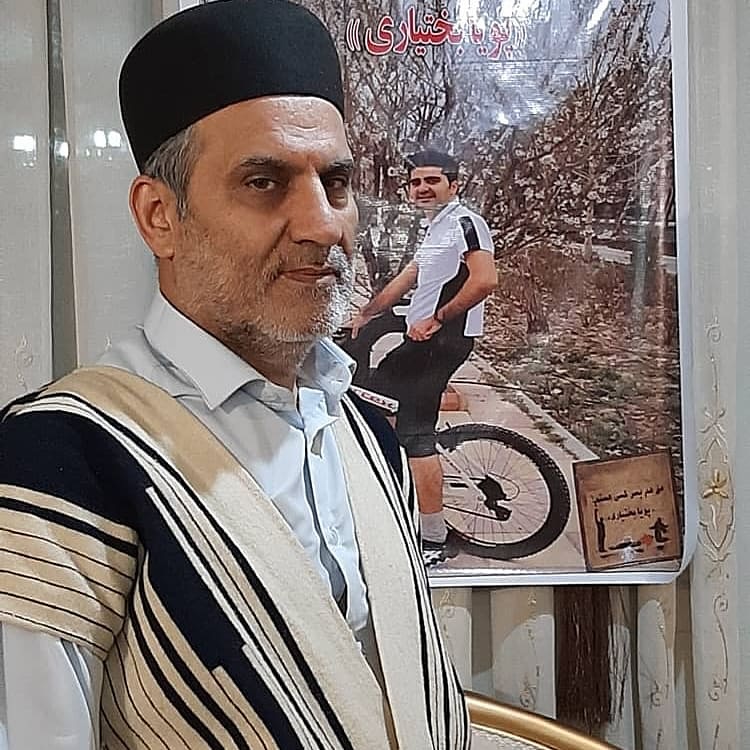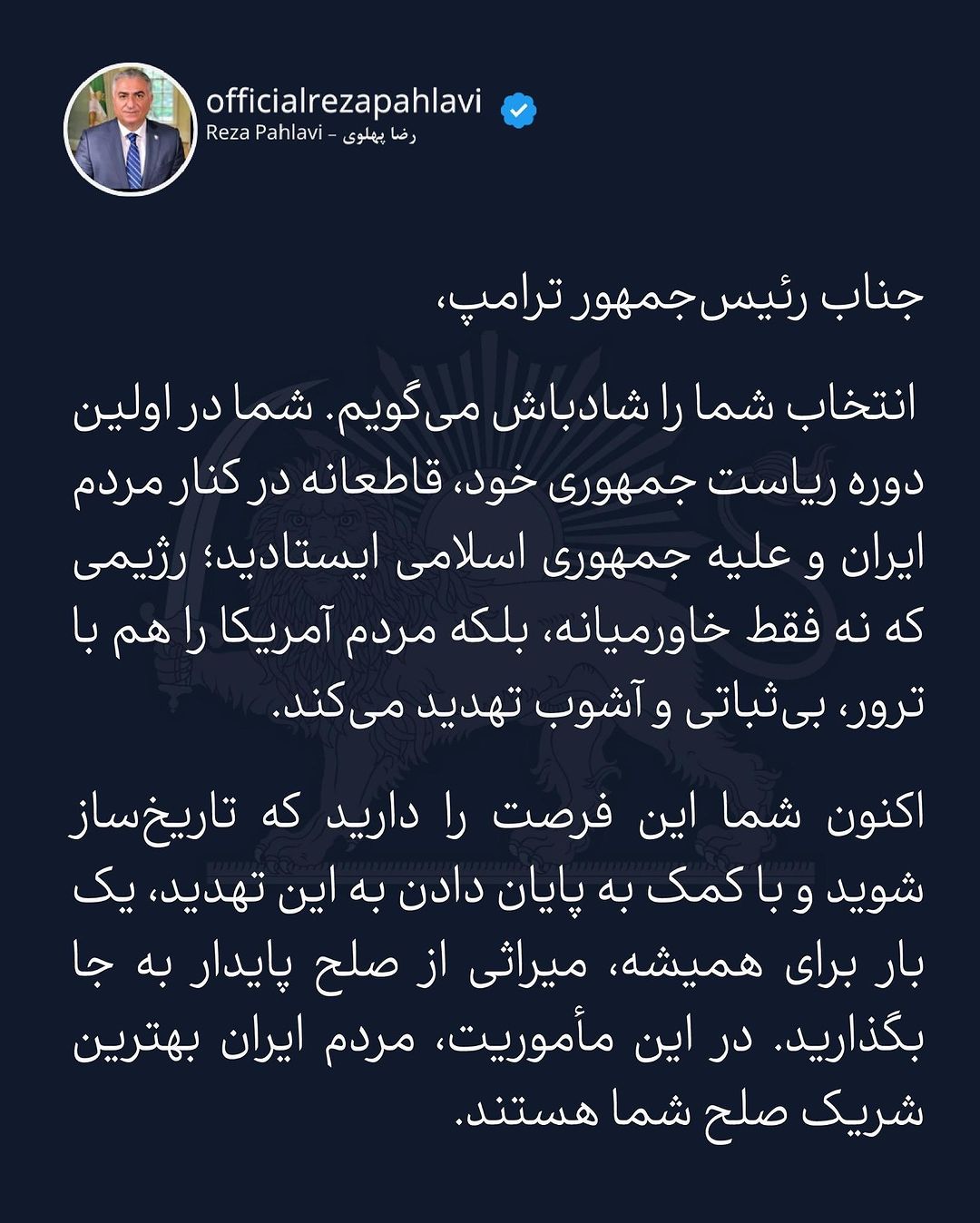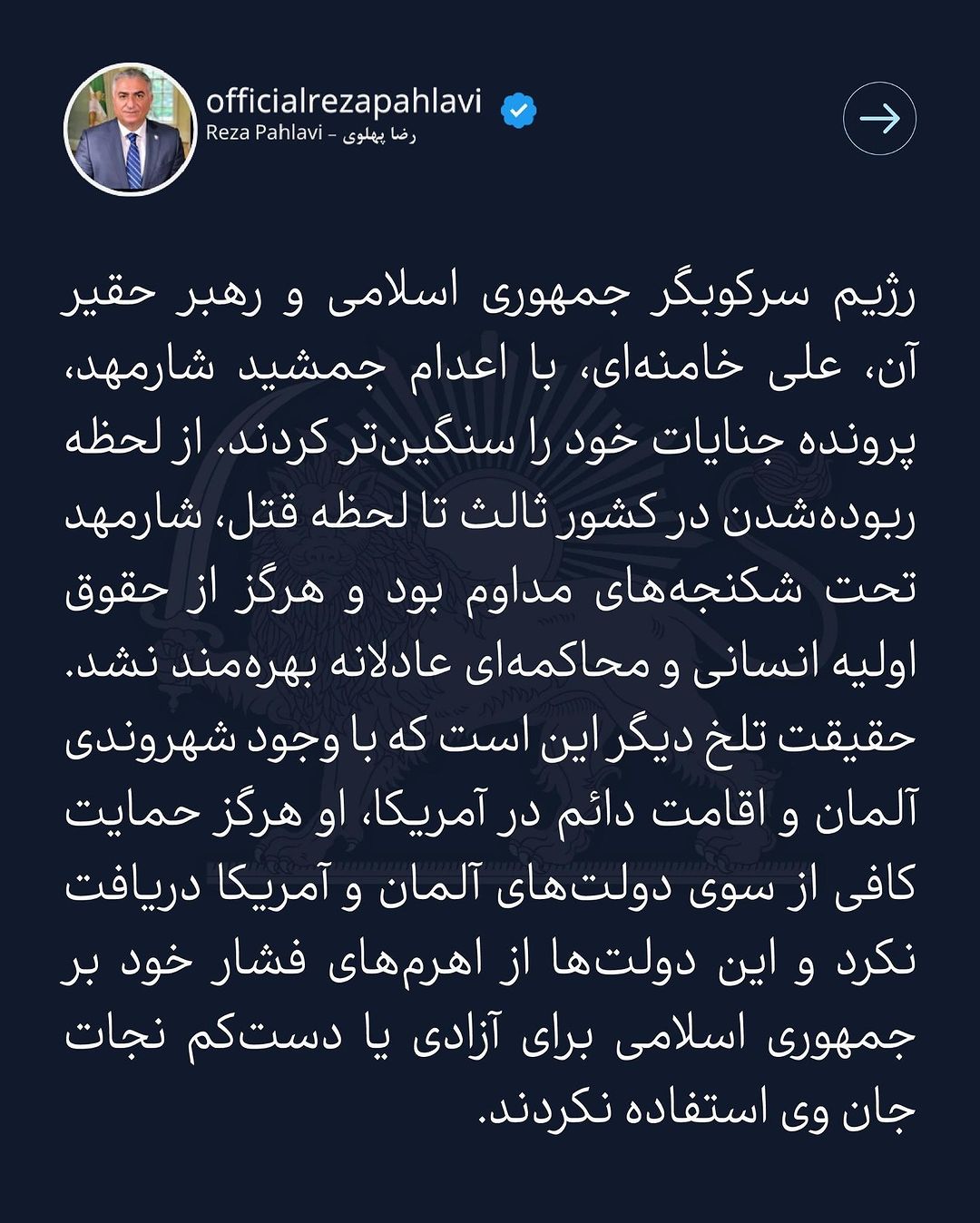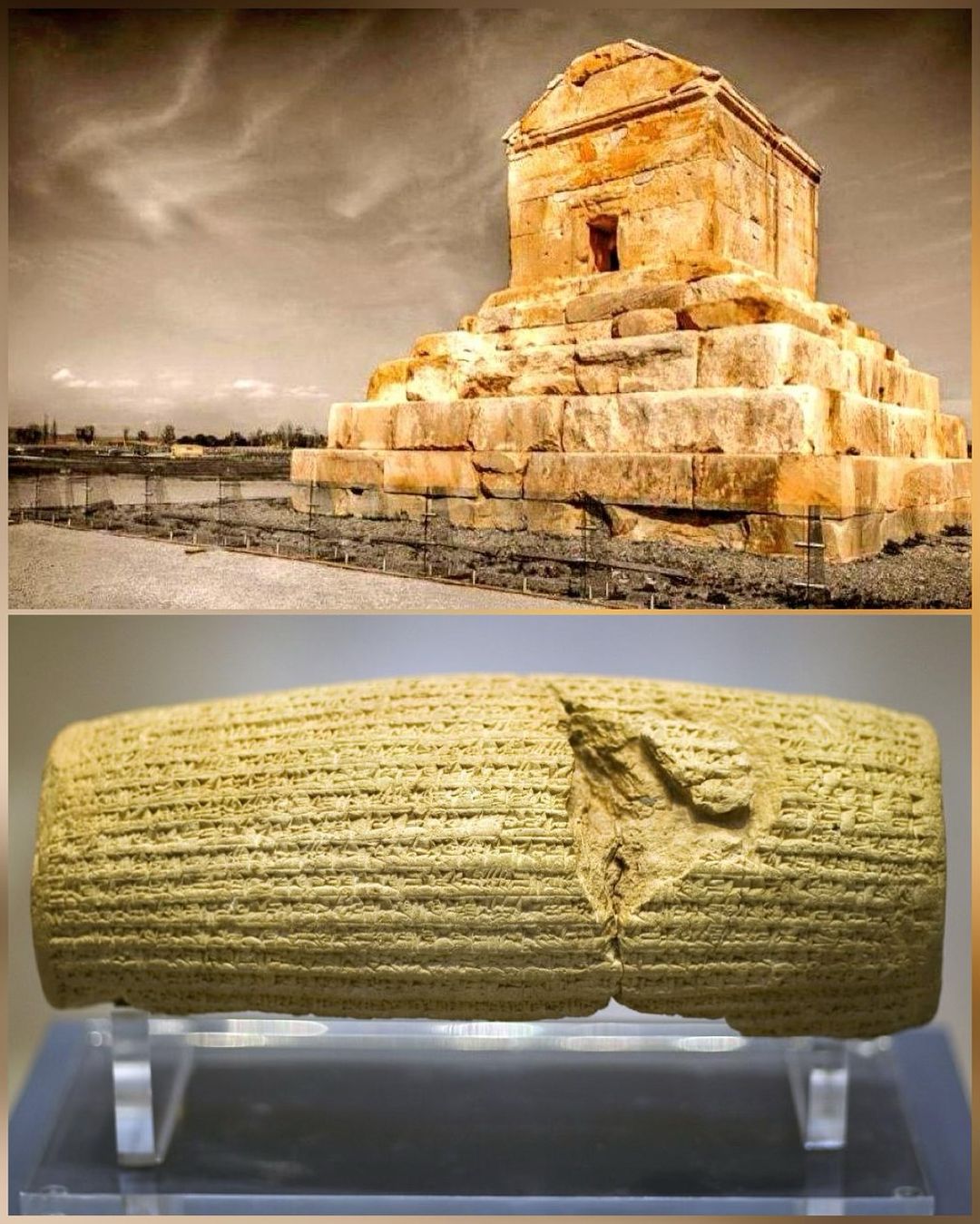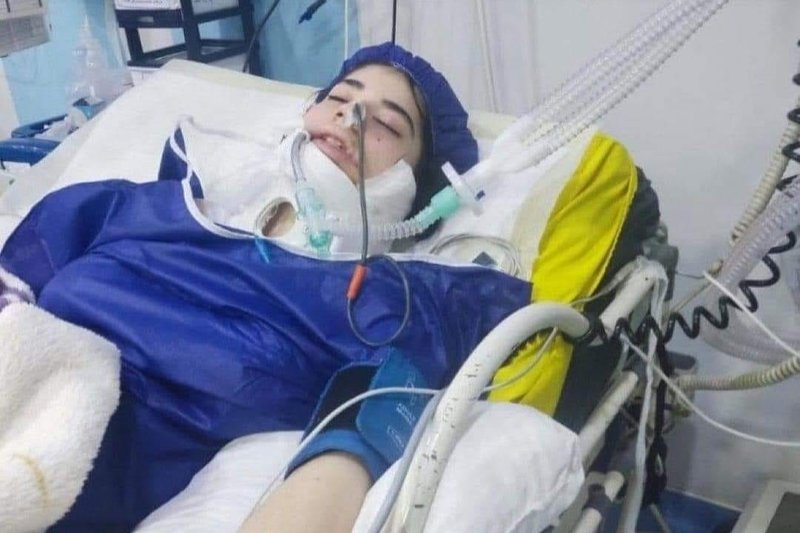مهمانان ارجمند، دوستان عزیز و همرزمان گرامی در مسیر صلح و آزادی
برای من افتخار بزرگی است که امروز جایزه «معمار صلح» از کتابخانه نیکسون را دریافت میکنم. از صمیم قلب از مدیریت کتابخانه نیکسون، بنیاد نیکسون و همه کسانی که به حفظ میراث این شخصیت بزرگ و سیاستمدار برجسته، رئیسجمهور ریچارد نیکسون، تلاش میکنند، قدردانی میکنم.
افتخار دریافت این جایزه برای من از اهمیت ویژهای برخوردار است، نه تنها به دلیل دستاوردهای برجسته رئیسجمهور نیکسون در عرصه صلح جهانی، بلکه به دلیل پیوند عمیق و شخصی بین خانواده من و ایشان. امشب، هنگامی که به میراث صلح و دیپلماسی مینگریم، درمییابیم که ایستادگی بر سر حق، گاه نیازمند آن است که تنها بایستیم -چیزی که رئیسجمهور نیکسون بهتر از بسیاری دیگر درک کرده بود.
وقتی به میراث رئیسجمهور نیکسون فکر میکنیم، طبیعی است که به سیاست خارجی پیشگامانه او بیندیشیم: تصمیم جسورانه او برای گشایش در روابط با چین، تلاشهایش برای کاهش تنشها با اتحاد جماهیر شوروی از طریق سیاست موسوم به «دِتانت»، و تلاش خستگیناپذیرش برای برقراری صلح پس از جنگ ویتنام. اما دیدگاه رئیسجمهور نیکسون فراتر از مسائل فوری زمان خود بود. او خاورمیانه را بهعنوان منطقهای حیاتی میدید؛ منطقهای که کلید ثبات در جهانی بههم پیوسته را در دست داشت. و این رئیسجمهور نیکسون بود که اهمیت نقش ایران در برقراری صلح و امنیت در آن منطقه را بهتر از همه درک کرد.
ایران، تحت رهبری پدر مرحومم، همچون ستونی برای ثبات در خاورمیانه ایستاده بود. پدرم، شاه فقید، با تلاشهای بیوقفه، ایران را به کشوری مدرن و پیشرو بدل ساخت؛ کشوری که در آن رشد اقتصادی، آموزش و توسعه شکوفا شود. و در تمام آن سالها، رئیسجمهور نیکسون بهعنوان یک همپیمان مورد اعتماد و یک دوست ثابتقدم در کنار ایران ایستاد. او بسیار زودتر از دیگران به اهمیت یک ایران قوی و صلحجو در حفظ ثبات خاورمیانه پی برد.
اما امشب، میخواهم درباره موضوعی بسیار شخصیتر صحبت کنم. برای من، میراث رئیسجمهور نیکسون تنها به سیاست خارجی محدود نمیشود، بلکه شامل دوستی، دوستی و وفاداری به معنای واقعی کلمه است.
بسیاری از شما با تاریخ دشوار خانواده من آشنا هستید. هنگامی که پدرم به تبعید رفت، جهان بهسرعت پشتش را به او کرد. کسانی که زمانی به رهبری، بینش و حتی کمکهای او وابسته بودند، در لحظه نیاز، راحتتر دیدند که او را رها کنند. اما در میان آن همه بیوفایی، یک نفر بود که ماند. آن شخص رئیسجمهور نیکسون بود.
وقتی پدرم در سال ۱۹۸۰ درگذشت، رئیسجمهور نیکسون درنگ نکرد و به مصر سفر کرد تا در مراسم خاکسپاری او شرکت کند. با این کار، او به همراه رئیسجمهور انور سادات، یکی از تنها دو رهبر جهانی با جایگاه برجسته بود که در مراسم شرکت کرد. با وجود تغییر بادهای سیاسی، و با وجود آسانتر بودن رویگرداندن که بسیاری دیگر آن را انتخاب کردند، رئیسجمهور نیکسون تصمیم گرفت در کنار دوست خود بایستد، و با این کار، در کنار مردم ایران ایستاد.
این تصمیمی بر پایه مصلحت سیاسی نبود؛ بلکه این تصمیمی بود که ریشه در اصول و باور داشت. رئیسجمهور نیکسون آنچه را که بسیاری دیگر نادیده گرفتند، درک میکرد: اینکه دوستی واقعی نباید بر اساس مصلحت باشد. او غریزی، نه نمایشی، میدانست که ایستادن در جبهه درست تاریخ به معنای انجام آن است، حتی اگر محبوب نباشد.
امروز که به آن سالهای دشوار مینگرم، در حالی که احساس محبت و قدردانی عمیقی نسبت به رؤسای جمهور سادات و نیکسون دارم، هیچ تلخی نسبت به دیگر رهبران جهانی که پدرم و کشورم را رها کردند ندارم. در واقع، اصلا به آنها فکر نمیکنم. برای من، بزرگترین تایید، از جانب رهبران یا شخصیتهای سیاسی نیست، بلکه از جانب ملت ایران است.
امروز، در خیابانهای ایران، مردم نام پدرم را فریاد میزنند. آنها او را نه تنها بهعنوان یک رهبر دوران گذشته، بلکه بهعنوان نمادی از استقلال، پیشرفت، افتخار و خدمت به کشور به یاد میآورند. با وجود دهههایی که گذشته، خاطره او در دلهای ایرانیان زنده است. بزرگترین پیروزی او نه از اقدامات دولتها، بلکه از صدای مردم عادی است که میراث او را گرامی میدارند.
همانطور که گفتم، رئیسجمهور نیکسون اغلب بهتنهایی ایستاده بود. بسیاری از کسانی که برای آزادی ایران میجنگیدند نیز بهتنهایی و در برابر فشارهای رسانهها و مؤسسات جهانی این کار را انجام دادند. حتی امروز هم آن فشارها ادامه دارد. اما امروز شرایط تغییر کرده است. زیرا آن مردم عادی که نام پدرم را گرامی میدارند، این کار را فقط از روی نوستالژی انجام نمیدهند؛ آنها، میلیونها نفر در سراسر ایران، فوقالعاده شجاع هستند. زیرا آنها تنها به آیندهای بهتر که پدرم معتقد بود شایسته آن هستند، امید ندارند. آنها برای آن آینده مبارزه میکنند.
اغلب به من گفته میشد که در مبارزه برای کشورم پیشرفت نخواهم کرد، زیرا نه دستگاه دولتی داشتم، نه بودجه کافی و نه ارتش. اما اکنون من چنین ارتشی دارم: هممیهنان فوقالعاده شجاعم. و به عنوان کسی که زمانی لباس نظامی کشورم را بر تن داشتم، اکنون بیش از هرکسی، افتخارم این است که کنار مردم ایران بایستم. و تا پیروزی در کنارشان خواهم ایستاد.
بنابراین، امشب که این جایزه را میپذیرم، نه فقط برای خود، بلکه برای مردم ایران میپذیرم. این افتخار متعلق به آنهاست. آنها معماران واقعی صلح هستند. دهههاست که آنان زیر یوغ رژیمی ظالمانه متحمل رنجهای غیرقابل تصور شدهاند؛ رژیمی که تلاش کرده است امیدها و آرزوهایشان را نابود کند. اما با وجود همه اینها، آنها همچنان برخاستهاند و همچنان برای تحقق تمدن بزرگ ما مبارزه میکنند.
فداکاریهای آنها در عرصه جهانی اغلب نادیده گرفته شده است. اما امشب، از طریق این تقدیر، کتابخانه نیکسون به شجاعت و استقامت آنان نور میافکند. همانطور که رئیسجمهور نیکسون زمانی در کنار پدرم ایستاد، اکنون کتابخانه نیکسون در کنار مردم ایران ایستاده است، و نه راه آسان و محبوب، بلکه راه حقیقت و عدالت را برگزیده است.
برای بیش از چهار دهه، مردم ایران برای ابتداییترین حقوق انسانی خود در مبارزه بودهاند. آنان با آزار، زندان، شکنجه و مرگ مواجه شدهاند، تنها به خاطر آنکه جرات کردند آنچه را که باید برای همگان تضمین شود، مطالبه کنند: حق زندگی در صلح، حق آزادی بیان و حق انتخاب رهبرانشان بدون ترس.
از جنبش دانشجویی سال ۱۳۷۸ و حمله مرگبار رژیم به کوی دانشگاه تهران، تا اعتراضات ۱۳۸۸ که میلیونها نفر به نام آزادی به خیابانها آمدند، تا مبارزان آزادی آبان ۹۸، و تا جوانان شجاع امروز که با به خطر انداختن همه چیز، قوانین ستمگرانه رژیم را به چالش میکشند، اینها معماران واقعی صلح هستند. مبارزه آنها برای قدرت یا تسخیر نیست؛ بلکه برای حق ساده اما عمیق زندگی با عزت است.
با این حال، ما در یک نقطه خطرناک قرار داریم. بادهای جنگ در منطقه ما میوزد. اما باید روشن باشد که این جنگ مردم ایران نیست. این جنگ یک دیکتاتور، علی خامنهای است که از تفرقه و درگیری سود میبرد. مردم ایران به دنبال جنگ نیستند. آنها خواهان صلح، امنیت و آیندهای آزاد از ظلم و ستم هستند.
آنها برای آن آینده مبارزه میکنند. تلاش آنها تنها برای آزادی ایران نیست، بلکه برای رهایی خاورمیانه، اعراب و اسرائیلیها از وحشت جمهوری اسلامی نیز است.
همین هممیهنان عزیزم هستند که باعث شدهاند من در این مبارزه بمانم. من برای خود چیزی نمیخواهم، تنها میخواهم به آنها خدمت کنم. تا زمانی که زندهام، مأموریت همیشگیام را برای رهایی ایران از این رژیم سرکوبگر ادامه خواهم داد. هر کاری که از دستم برآید انجام خواهم داد تا آینده ایران بر پایه صلح، دموکراسی و عدالت بنا شود.
ما در آستانه تغییر هستیم و من همچنان به وظیفهام نسبت به کشور و مردمم پایبند خواهم ماند. با تمام توان تلاش خواهم کرد تا ایران، یک گذار آرام و امن به یک دموکراسی سکولار را تجربه کند که در آن همه شهروندان بهطور برابر زندگی کنند و از هر نوع تبعیض در امان باشند.
در این مأموریت، از رهبران بزرگ دوران جوانیام الهام میگیرم—پدرم، رئیسجمهور سادات و رئیسجمهور نیکسون. این مردان میدانستند که صلح فقط به معنای نبود جنگ نیست، بلکه به معنای حضور عدالت، کرامت و آزادی است. آنها معماران یک جهان بهتر بودند و من قصد دارم میراث آنها را ادامه دهم.
بینش رئیسجمهور نیکسون برای خاورمیانهای صلحآمیز و امن همچنان به اندازه دوران ریاستجمهوریاش مرتبط و مهم است. جسارت او در پیگیری صلح، آمادگیاش برای به چالش کشیدن وضع موجود، و باور استوارش به آزادی همچنان برای من الهامبخش است.
در این لحظه، این جایزه را میپذیرم، نه با امید، بلکه با باور به اینکه روزی نزدیک، مردم ایران بار دیگر جایگاه شایسته خود را در جهان به دست آورند: ایرانی آزاد، دموکراتیک و صلحجو. این همان آیندهای است که ما در پی آن هستیم. این آیندهای است که به آن دست خواهیم یافت.
بار دیگر از شما برای این افتخار بزرگ سپاسگزارم. من این جایزه را به یاد تمام ایرانیانی که جان خود را در راه بازپسگیری ایران از دست دادهاند، میپذیرم. همانطور که بر سنگنوشته رئیسجمهور نیکسون آمده است: «بزرگترین افتخاری که تاریخ میتواند ارزانی دارد، عنوان مصلح است.» امشب شما یاد هممیهنان جاویدنامم را گرامی داشتید.
متشکرم.
Architect of Peace Award Acceptance Remarks
Distinguished guests, dear friends, and fellow advocates of freedom and peace,
It is an honor to receive the Nixon Library’s "Architect of Peace" Award. I extend my heartfelt gratitude to the leadership of the Nixon Library, the Nixon Foundation, and all those who continue to preserve the legacy of a great statesman, President Richard Nixon.
This honor is especially meaningful, not only because of President Nixon’s towering contributions to global peace, but because of the deep, personal connection between President Nixon and my family. Tonight, as we reflect on the legacy of peace and diplomacy, we also recognize that standing for what is right sometimes requires standing alone—something President Nixon understood better than most.
When we think of President Nixon’s legacy, we naturally recall his groundbreaking foreign policy—his bold decision to open relations with China, his efforts to ease tensions with the Soviet Union through détente, and his tireless work to secure peace in the aftermath of Vietnam. But President Nixon’s vision extended beyond the immediate concerns of his time. He saw the Middle East as a vital region—one that held the key to stability in an increasingly interconnected world. And it was President Nixon who best understood the vital role Iran played in securing peace and security in that region.
Iran, under my late father’s leadership, stood as a pillar of stability in the Middle East. My father, the late Shah, worked tirelessly to build a modern, progressive Iran—a nation where economic growth, education, and development could flourish. And throughout those years, President Nixon stood as a trusted ally and a steadfast friend of Iran. He recognized, long before many others, the importance of a strong, peaceful Iran in safeguarding the Middle East.
But tonight, I wish to reflect on something much more personal. For me, President Nixon’s legacy is not just one of foreign policy, but one of friendship—friendship and loyalty in the truest sense of those words.
Many of you know the difficult history of my family. When my father was forced into exile, the world was quick to turn its back. Those who once relied on his leadership, vision, and even patronage found it easier to abandon him in his moment of need. Yet, amidst this desertion, one man remained. That man was President Nixon.
When my father passed away in 1980, President Nixon did not hesitate to travel to Egypt for his funeral. In doing so, he joined President Anwar Sadat as one of the only two world leaders of significant global stature to attend. Despite the shifting political winds, despite the ease with which so many others had turned away, President Nixon chose to stand by his friend, and in doing so, he stood by the people of Iran.
It was not a decision based on political expediency—it was a decision rooted in integrity and conviction. President Nixon knew what so many others chose to forget: that true friendship is not about convenience. Not performatively, but instinctively, he knew that standing on the right side of history meant doing so even when it is not popular.
Today, as I reflect on those difficult years, while I feel immense personal affection and appreciation for Presidents Sadat and Nixon, I feel no bitterness toward those other world leaders who abandoned my father and my nation. Indeed, I do not think much about them at all. For me, the greatest recognition does not come from the actions of world leaders or political figures—it comes from the people of Iran themselves.
Today, in the streets of Iran the people chant the name of my father. They remember him not simply as a leader of a bygone era, but as a symbol of sovereignty, progress, pride and service to the nation. Despite the decades that have passed, his memory is alive in the hearts of Iranians. His greatest vindication comes not from the actions of governments, but from the voices of ordinary people who honor his legacy.
I spoke of President Nixon standing alone. Often those fighting for Iran’s liberation did so alone and against the pressures of the global media and establishment. Even today, those pressures continue. But today things have changed. Because those ordinary people who honor my father’s name do so not just out of nostalgia. Those ordinary people, millions of them across my country, are extraordinarily brave. Because they are not just hoping for the better future my father believed they deserved. They are fighting for it.
I was often told that I would not get far in my campaign for my country because I did not have the apparatus of a state, certainly not the proper funding, and no army. But now, I have such an army– my extraordinarily brave compatriots. And having once worn my nation’s uniform, there is no one I stand more proudly side by side with than the people of Iran today. And I will stand with them until victory.
And so, as I accept this award tonight, I do so not just for myself. This honor belongs to the people of Iran. They are the true architects of peace. For decades, they have endured unimaginable suffering under a brutal regime that has sought to extinguish their hopes and dreams. Yet despite everything, they continue to rise, they continue to fight for the realization of our great civilization.
Their sacrifices are too often ignored on the world stage. But tonight, through this recognition, the Nixon Library is shining a light on their courage and resilience. Just as President Nixon once stood with my father, the Nixon Library now stands with the Iranian people, choosing not to follow the easy or popular path, but to stand on the side of truth and justice.
For over four decades, the people of Iran have been engaged in a struggle for their most basic human rights. They have faced persecution, imprisonment, torture, and death, all for daring to demand what should be guaranteed to all: the right to live in peace, to express their beliefs freely, and to choose their leaders without fear.
From the student movement of 1999 and the regime's deadly attack on the Tehran University students' dormitory, to the protests of 2009, where millions took to the streets in the name of freedom, to the freedom fighters of November 2019, to the brave youth of today, who risk everything by defying the regime’s oppressive laws—these are the true architects of peace. Their struggle is not for power or for conquest; it is for the simple yet profound right to live in dignity.
Yet we stand at a dangerous juncture. The winds of war are blowing across our region. But let us be clear—this is not the war of the Iranian people. This is the war of a dictator, Ali Khamenei, who thrives on division and conflict. The Iranian people do not seek war. They seek peace, security, and a future free from tyranny.
They are fighting for that future. Theirs is not just a quest to free Iran but to free the Middle East, Arabs and Israelis, from the terror of the Islamic Republic.
It is because of them, my dear compatriots, that I have stayed in this fight. I seek nothing for myself. Only to serve them. So as long as I live, I will continue my lifelong mission to free Iran from this oppressive regime. I will do everything in my power to ensure that the future of Iran is one of peace, democracy, and justice.
We are on the cusp of change, and I remain committed to doing my duty to my country and my people. I will work tirelessly to oversee and ensure that Iran undergoes a peaceful and secure transition to a secular democracy—one where every citizen can live as equals, free from any form of discrimination.
In this mission, I draw inspiration from the great leaders of my youth—my own father, President Sadat, and President Nixon. These men understood that peace is not simply the absence of war, but the presence of justice, dignity, and freedom. They were architects of a better world, and it is their legacy that I seek to carry forward.
President Nixon’s vision for a peaceful and secure Middle East remains as relevant today as it was during his presidency. His boldness in pursuing peace, his willingness to challenge the status quo, and his unshakable belief in freedom continue to inspire me.
As I accept this award, I do so with not hope, but belief, that we are nearing the day when the Iranian people will once again take their rightful place in the world—a free, democratic, and peaceful Iran. This is the future we seek. This is the future we will achieve.
Thank you again for this profound honor. I accept it in memory of all those Iranians who have lost their lives in the battle to reclaim Iran. As President Nixon’s epitaph says “The greatest honor history can bestow is the title of peacemaker.” Tonight you have honored the memories of my fallen compatriots.
Thank you.

